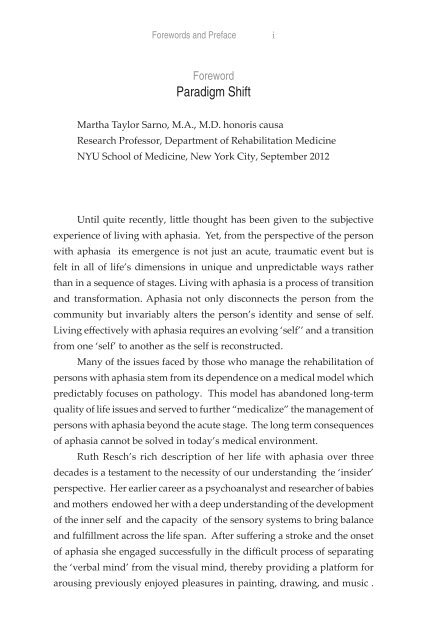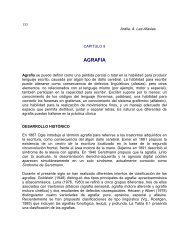the PDF of her book - National Aphasia Association
the PDF of her book - National Aphasia Association
the PDF of her book - National Aphasia Association
Create successful ePaper yourself
Turn your PDF publications into a flip-book with our unique Google optimized e-Paper software.
Forewords and Preface i<br />
Foreword<br />
Paradigm Shift<br />
Martha Taylor Sarno, M.A., M.D. honoris causa<br />
Research Pr<strong>of</strong>essor, Department <strong>of</strong> Rehabilitation Medicine<br />
NYU School <strong>of</strong> Medicine, New York City, September 2012<br />
Until quite recently, little thought has been given to <strong>the</strong> subjective<br />
experience <strong>of</strong> living with aphasia. Yet, from <strong>the</strong> perspective <strong>of</strong> <strong>the</strong> person<br />
with aphasia its emergence is not just an acute, traumatic event but is<br />
felt in all <strong>of</strong> life’s dimensions in unique and unpredictable ways ra<strong>the</strong>r<br />
than in a sequence <strong>of</strong> stages. Living with aphasia is a process <strong>of</strong> transition<br />
and transformation. <strong>Aphasia</strong> not only disconnects <strong>the</strong> person from <strong>the</strong><br />
community but invariably alters <strong>the</strong> person’s identity and sense <strong>of</strong> self.<br />
Living effectively with aphasia requires an evolving ‘self’’ and a transition<br />
from one ‘self’ to ano<strong>the</strong>r as <strong>the</strong> self is reconstructed.<br />
Many <strong>of</strong> <strong>the</strong> issues faced by those who manage <strong>the</strong> rehabilitation <strong>of</strong><br />
persons with aphasia stem from its dependence on a medical model which<br />
predictably focuses on pathology. This model has abandoned long-term<br />
quality <strong>of</strong> life issues and served to fur<strong>the</strong>r “medicalize” <strong>the</strong> management <strong>of</strong><br />
persons with aphasia beyond <strong>the</strong> acute stage. The long term consequences<br />
<strong>of</strong> aphasia cannot be solved in today’s medical environment.<br />
Ruth Resch’s rich description <strong>of</strong> <strong>her</strong> life with aphasia over three<br />
decades is a testament to <strong>the</strong> necessity <strong>of</strong> our understanding <strong>the</strong> ‘insider’<br />
perspective. Her earlier career as a psychoanalyst and researc<strong>her</strong> <strong>of</strong> babies<br />
and mo<strong>the</strong>rs endowed <strong>her</strong> with a deep understanding <strong>of</strong> <strong>the</strong> development<br />
<strong>of</strong> <strong>the</strong> inner self and <strong>the</strong> capacity <strong>of</strong> <strong>the</strong> sensory systems to bring balance<br />
and fulfillment across <strong>the</strong> life span. After suffering a stroke and <strong>the</strong> onset<br />
<strong>of</strong> aphasia she engaged successfully in <strong>the</strong> difficult process <strong>of</strong> separating<br />
<strong>the</strong> ‘verbal mind’ from <strong>the</strong> visual mind, <strong>the</strong>reby providing a platform for<br />
arousing previously enjoyed pleasures in painting, drawing, and music .



